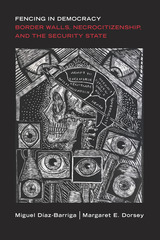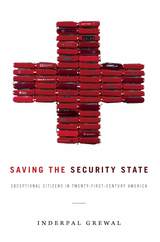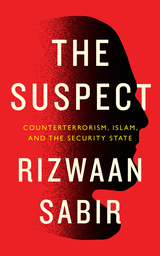3 books about Security State

Fencing in Democracy
Border Walls, Necrocitizenship, and the Security State
Miguel Díaz-Barriga and Margaret Dorsey
Duke University Press, 2019
Border walls permeate our world, with more than thirty nation-states constructing them. Anthropologists Margaret E. Dorsey and Miguel Díaz-Barriga argue that border wall construction manifests transformations in citizenship practices that are aimed not only at keeping migrants out but also at enmeshing citizens into a wider politics of exclusion. For a decade, the authors studied the U.S.-Mexico border wall constructed by the Department of Homeland Security and observed the political protests and legal challenges that residents mounted in opposition to the wall. In Fencing in Democracy Dorsey and Díaz-Barriga take us to those border communities most affected by the wall and often ignored in national discussions about border security to highlight how the state diminishes citizens' rights. That dynamic speaks to the citizenship experiences of border residents that is indicative of how walls imprison the populations they are built to protect. Dorsey and Díaz-Barriga brilliantly expand conversations about citizenship, the operation of U.S. power, and the implications of border walls for the future of democracy.
[more]

Saving the Security State
Exceptional Citizens in Twenty-First-Century America
Inderpal Grewal
Duke University Press, 2017
In Saving the Security State Inderpal Grewal traces the changing relations between the US state and its citizens in an era she calls advanced neoliberalism. Marked by the decline of US geopolitical power, endless war, and increasing surveillance, advanced neoliberalism militarizes everyday life while producing the “exceptional citizens”—primarily white Christian men who reinforce the security state as they claim responsibility for protecting the country from racialized others. Under advanced neoliberalism, Grewal shows, others in the United States strive to become exceptional by participating in humanitarian projects that compensate for the security state's inability to provide for the welfare of its citizens. In her analyses of microfinance programs in the global South, security moms, the murders at a Sikh temple in Wisconsin, and the post-9/11 crackdown on Muslim charities, Grewal exposes the fissures and contradictions at the heart of the US neoliberal empire and the centrality of race, gender, and religion to the securitized state.
[more]

The Suspect
Counterterrorism, Islam, and the Security State
Rizwaan Sabir
Pluto Press, 2021
'An instant classic. Sabir is an inspiration' Arun Kundnani, author of The Muslims are Coming!
What impact has two decades' worth of policing and counterterrorism had on the state of mind of Muslims in Britain? The Suspect draws on the author's lived experiences of being suspected of terrorism to take the reader on a journey through British counterterrorism practices and the policing of Muslims.
Rizwaan Sabir describes what led to his arrest for suspected terrorism, his time in detention, and the surveillance he was subjected to on release from custody, including stop and frisk on the roadside, detentions at the border, and monitoring by police and government departments throughout his research.
Writing publicly for the first time about the traumatizing mental health effects of these experiences, he argues that these harmful outcomes are not the result of errors in government planning, but the consequences of using a counterinsurgency warfare approach to surveillance. If we are to break this injustice, we need to resist counterterrorism policy and practice.
What impact has two decades' worth of policing and counterterrorism had on the state of mind of Muslims in Britain? The Suspect draws on the author's lived experiences of being suspected of terrorism to take the reader on a journey through British counterterrorism practices and the policing of Muslims.
Rizwaan Sabir describes what led to his arrest for suspected terrorism, his time in detention, and the surveillance he was subjected to on release from custody, including stop and frisk on the roadside, detentions at the border, and monitoring by police and government departments throughout his research.
Writing publicly for the first time about the traumatizing mental health effects of these experiences, he argues that these harmful outcomes are not the result of errors in government planning, but the consequences of using a counterinsurgency warfare approach to surveillance. If we are to break this injustice, we need to resist counterterrorism policy and practice.
[more]
READERS
Browse our collection.
PUBLISHERS
See BiblioVault's publisher services.
STUDENT SERVICES
Files for college accessibility offices.
UChicago Accessibility Resources
home | accessibility | search | about | contact us
BiblioVault ® 2001 - 2024
The University of Chicago Press









